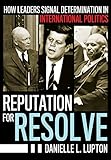Reputation for Resolve : How Leaders Signal Determination in International Politics / Danielle L. Lupton.
Material type: TextSeries: Cornell Studies in Security AffairsPublisher: Ithaca, NY : Cornell University Press, [2020]Copyright date: ©2021Description: 1 online resource (264 p.) : 2 b&w line drawings, 5 chartsContent type:
TextSeries: Cornell Studies in Security AffairsPublisher: Ithaca, NY : Cornell University Press, [2020]Copyright date: ©2021Description: 1 online resource (264 p.) : 2 b&w line drawings, 5 chartsContent type: - 9781501747717
- 9781501747731
- Determination (Personality trait) -- Political aspects
- Political leadership
- Reputation -- Political aspects
- World politics -- 1955-1965
- International Studies
- Political Science & Political History
- Security Studies
- POLITICAL SCIENCE / Security (National & International)
- communications, international reputations, foreign policy, crisis bargaining, international security
- 327.1 23
- D843 .L855 2020
- online - DeGruyter
| Item type | Current library | Call number | URL | Status | Notes | Barcode | |
|---|---|---|---|---|---|---|---|
 eBook
eBook
|
Biblioteca "Angelicum" Pont. Univ. S.Tommaso d'Aquino Nuvola online | online - DeGruyter (Browse shelf(Opens below)) | Online access | Not for loan (Accesso limitato) | Accesso per gli utenti autorizzati / Access for authorized users | (dgr)9781501747731 |
Frontmatter -- Contents -- List of Illustrations -- Acknowledgments -- Introduction: Why Leaders and Their Reputations for Resolve Matter -- 1. How Leaders Establish Reputations for Resolve -- 2. How Leader-Specific Reputations Form and Change across Repeated Interactions -- 3. How Contextual Factors Influence Leader-Specific Reputations -- 4. A Reputation for Resolute Action: Eisenhower and Berlin -- 5. A Reputation for Irresolute Action: Kennedy, Berlin, and Cuba -- Conclusion: Lessons in Leader-Specific Reputations for Resolve -- Appendix A: Methods -- Appendix B: Results -- Notes -- Bibliography -- Index
restricted access online access with authorization star
http://purl.org/coar/access_right/c_16ec
How do reputations form in international politics? What influence do these reputations have on the conduct of international affairs? In Reputation for Resolve, Danielle L. Lupton takes a new approach to answering these enduring and hotly debated questions by shifting the focus away from the reputations of countries and instead examining the reputations of individual leaders.Lupton argues that new leaders establish personal reputations for resolve that are separate from the reputations of their predecessors and from the reputations of their states. Using innovative survey experiments and in-depth archival research, she finds that leaders acquire personal reputations for resolve based on their foreign policy statements and behavior. Reputation for Resolve shows that statements create expectations of how leaders will react to foreign policy crises in the future and that leaders who fail to meet expectations of resolute action face harsh reputational consequences.Reputation for Resolve challenges the view that reputations do not matter in international politics. In sharp contrast, Lupton shows that the reputations for resolve of individual leaders influence the strategies statesmen pursue during diplomatic interactions and crises, and she delineates specific steps policymakers can take to avoid developing reputations for irresolute action. Lupton demonstrates that reputations for resolve do exist and can influence the conduct of international security. Thus, Reputation for Resolve reframes our understanding of the influence of leaders and their rhetoric on crisis bargaining and the role reputations play in international politics.
Mode of access: Internet via World Wide Web.
In English.
Description based on online resource; title from PDF title page (publisher's Web site, viewed 01. Dez 2022)


